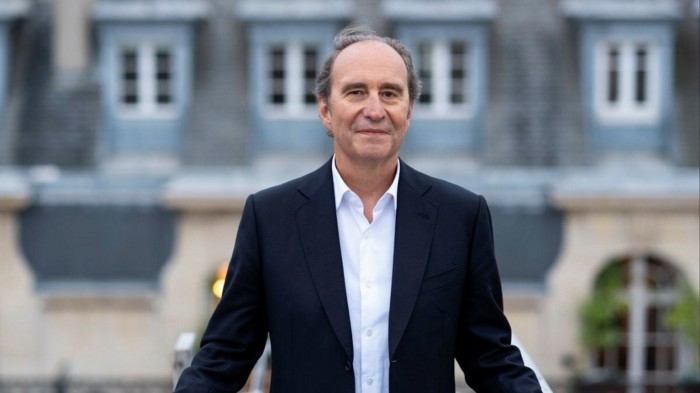Ex-Google CEO Eric Schmidt has joined Niel’s non-profit research lab Kyutai which aims to create open-source AI models © Eva Marie Uzcategui/Bloomberg
Niel has supported the AI ecosystem in France with investment of about €500mn so far, and said he could eventually deploy billions.
A non-profit research lab called Kyutai aims to create open-source AI models — a project joined by ex-Google CEO Eric Schmidt. Niel’s cloud infrastructure company Scaleway runs one of the biggest supercomputers in the European private sector.
Niel makes early-stage investments of €15mn annually through his Kima Ventures fund, and also backed the New Wave fund where he recently intervened to end a power struggle between founders.
There is still time to mint AI winners in Europe, Niel said, given the quality of its maths and engineering institutes and how tech giants have yet to establish dominance. Plus, the scale of the opportunity in AI means that “it will not be one company that wins, but dozens or even hundreds,” he said.
“Sure, the world moves faster now, the resources are greater. But there will always be two clever kids somewhere in the world, working out of a garage, with a technological vision or a new idea.”
Niel was once one such a kid, as the 57-year-old iconoclastic entrepreneur recently related in a memoir-like book of interviews titled Une Sacrée Envie de Foutre le Bordel (“An intense urge to stir up trouble”).
He dabbled in hacking as a teenager and briefly became an asset for the French domestic spy agency as it was building its first cyber unit. They had him hack then French president François Mitterrand’s phone so the agency could get a bigger budget, according to the book.
Niel’s first lucrative business was running adults-only sex chat services on Minitel, a rudimentary French network that preceded the internet.
But the real breakthrough came in telecoms when he founded Iliad in 1990 as a low-cost challenger when France opened the market to competition. It went public in 2004.
Only months after the IPO, Niel was arrested on suspicion of misusing assets and pimping, which was related to investments in sex shops he made with a partner from his Minitel days.
He spent a month in jail and was later convicted on the lesser charge. Niel wrote that the judge gave him advice he has never forgotten: you can skim the line between right and wrong but never cross it.
Flush from Iliad’s success, Niel invested in technology, real estate, and media such as Le Monde newspaper. Now private, Iliad has expanded to around 20 countries, most recently Ukraine. In Paris, Niel built the world’s biggest start-up incubator called Station F and opened a free coding school.
As his projects multiplied, Niel took on an ambassador-like role for European tech. When Pavel Durov, the billionaire creator of the Telegram messaging app, was arrested and questioned in France over alleged complicity in criminal activity, his first phone call was to Niel.
“When I went to prison everyone disappeared on me. So when a friend runs into a problem in France, I’m not the kind of person who doesn’t pick up the phone.”
In September, Niel joined the board of ByteDance, the Chinese parent of TikTok, that has been scrutinised in the US and Europe over data privacy, misinformation and security.
US President Joe Biden signed a law to ban the platform over national security concerns if its Chinese parent does not divest by 2025. President-elect Donald Trump has said he could reverse the decision — an eventuality that Niel personally supports.
“I think it would be positive for TikTok to continue to exist, with its skilled workforce, in the US. Positive for competition, for citizens, for the improvement of products,” he said.
“What worries me is that if TikTok comes under pressure, then all the other social networks, including the Americans ones, will also,” he said.
Niel said he had been a “small investor for a long time” and thought being the sole European on the board would help ByteDance’s plans to expand in the region.
“We are capable of welcoming them in Europe and helping them to invest . . . and to understand who we are as we are, [our] way of operating,” he said. For them, “it creates value, and for us, it creates future-oriented investment in Europe.”
Source link : http://www.bing.com/news/apiclick.aspx?ref=FexRss&aid=&tid=6739b2f5cf3044d5abb2648034f4f7c6&url=https%3A%2F%2Fwww.ft.com%2Fcontent%2Ffff78d7b-9acb-43c2-a675-fdc9b00a2878&c=6371265416702413546&mkt=de-de
Author :
Publish date : 2024-11-17 00:06:00
Copyright for syndicated content belongs to the linked Source.
